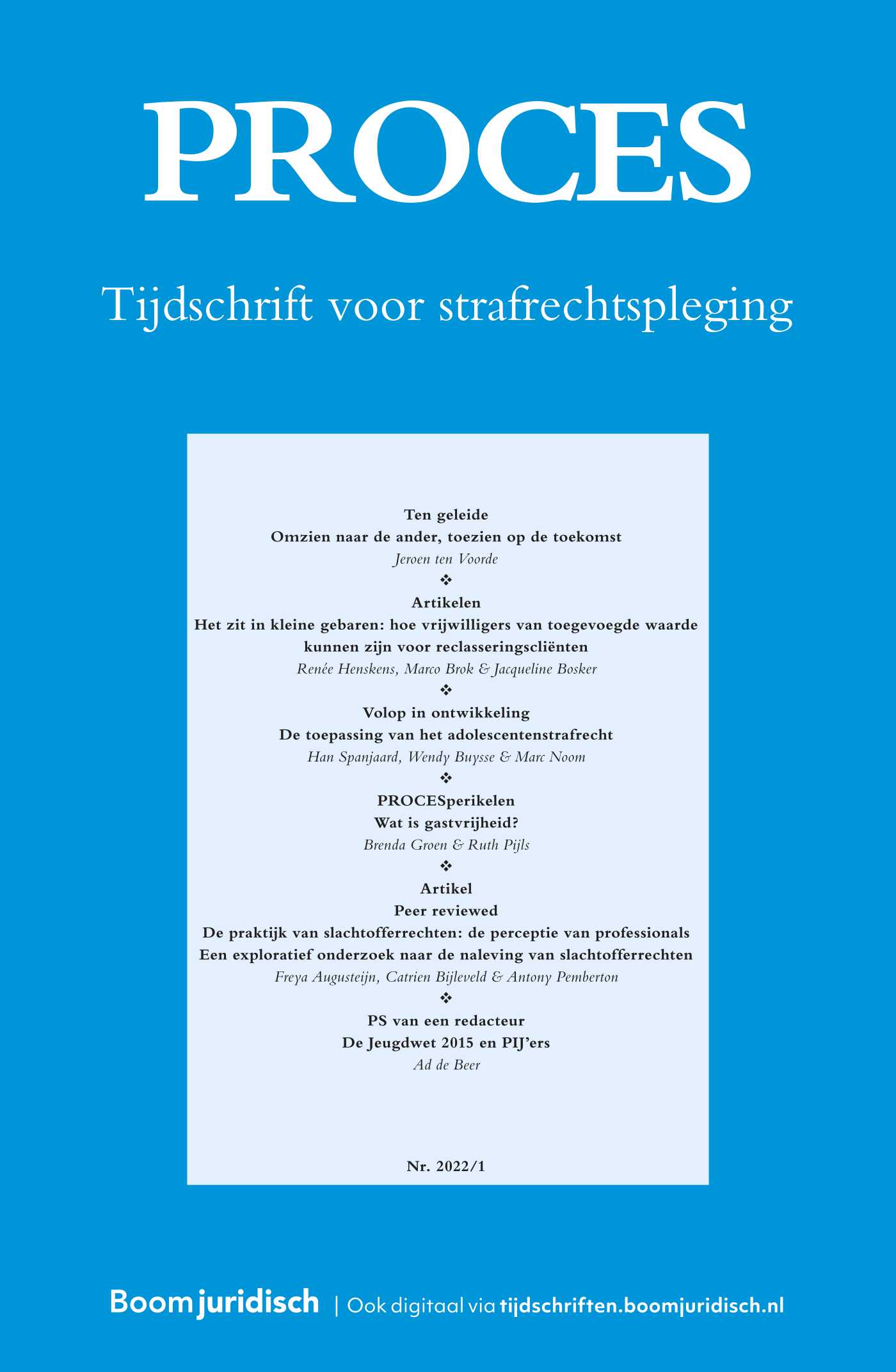|
For several years the Netherlands has been facing group violence around football matches and other recreational events. Offenders involved may be characterized as notorious troublemakers, incidental offenders or ‘new hooligans’. Notorious troublemakers and new hooligans actively look for risky situations. Their behavior is related to both contextual factors and individual predispositions. In contrast incidental offenders get involved in public disorder only due to a combination of circumstances. (Individual) disruptive behavior during public disorder therefore has different underlying causes. A combination of a person-centered approach, early identification of potential notorious troublemakers and situational prevention measures are important pillars for future policy and police practice. |


PROCES
Meer op het gebied van Criminologie en veiligheid
Over dit tijdschriftMeld u zich hier aan voor de attendering op dit tijdschrift zodat u direct een mail ontvangt als er een nieuw digitaal nummer is verschenen en u de artikelen online kunt lezen.
| Redactioneel |
Peer review en praktijkoriëntatie |
| Auteurs | Dr. Janine Janssen en Mr. dr. Maartje van der van der Woude |
| Auteursinformatie |
| Artikel |
Grootschalige ordeverstoringen rondom evenementenOorzaken, plegers en handvatten voor de beleids- en politiepraktijk |
| Trefwoorden | ordeverstoorders, groepsgeweld, rellen, aanpak |
| Auteurs | Drs. Tom van Van Ham, Dr. Otto M.J. Adang, Dr. Henk B. Ferwerda e.a. |
| SamenvattingAuteursinformatie |
| Artikel |
Gevangenisstraffen van moeders en de belangen van kinderen |
| Trefwoorden | Imprisonment of mothers / Detentie van moeders, Alternative sentencing of mothers / Alternatieve straf voor moeders, Children’s interests / Belangen van kinderen |
| Auteurs | Prof. dr. Doret De de Ruyter, Drs. Sanne Hissel en Prof. dr. mr. Catrien Bijleveld |
| SamenvattingAuteursinformatie |
|
A substantial number of children are confronted with the detention of their mothers. Empirical research shows that these children’s well-being is seriously affected, although no study has been able to assess whether a mother’s detention as such causes long-term damage. On the basis of children’s interests, this article defends the principle that mothers who are actively involved in raising their children should not receive a prison sentence but an alternative punishment, unless continuing care is detrimental to the children or if the legal order or interests of society and its citizens would be disproportionally threatened. The article ends with several practical implications. |
| Artikel |
Draaideurvreemdelingen in de strafrechtsketen? |
| Trefwoorden | VRIS, illegale immigranten, strafrecht, terugkeer, migratie |
| Auteurs | Daphne Huininga MSc en Mr. dr. Maartje van der van der Woude |
| SamenvattingAuteursinformatie |
|
Irregular immigration is considered a big problem to Western societies. In the Dutch political discourse much attention is being attributed to dealing with a specific group of irregular immigrants: those who commit crimes and cause nuisance. Despite firm migration policies focusing on catching and deporting criminal undocumented immigrant, many seem to be coming back. By means of a exploratory study this article empirically explores the underlying rationales and traits of illegal immigrants returning to the Netherlands after they have been deported. |
| Artikel |
Zwijgen is zilver, spreken is goud. De weigerende observandus en de voorgestelde wijziging van artikel 37a Sr |
| Trefwoorden | TBS, weigerende observandus, gedragsdeskundige rapportage, medische dossiers, wetsvoorstel forensische zorg |
| Auteurs | Mr. Martine Valk |
| SamenvattingAuteursinformatie |
|
When a person commits a severe crime in the Netherlands, for which he cannot be (fully) held responsible because of a mental disorder, a judge may impose a hospital order in a secured psychiatric institution. To make this possible, behavioural experts have to assess whether the suspect suffered from a mental disorder at the time of the crime. However, during this assessment a suspect has the right to remain silent. Since recent years the number of non-cooperating suspects is increasing. To solve this problem, the Secretary of State of Security and Justice has submitted a legislative proposal, which makes it possible to force health professionals to submit past medical records of the suspect to the behavioural experts for their assessment without his consent. This breaches the professional law of confidentiality. Following case law of the European Court of Human Rights, this can only be justified, if it complies with the principles of proportionality, subsidiarity and necessity. The legislative proposal does not comply with these principles, as alternatives are available. These are: improvement of the forensic psychiatric care, reduction of the duration of the treatment and extension of the behavioral research period. |
| Column |
Een nieuwe reclassering? |
| Auteurs | Jaap A. Van van Vliet |
| Auteursinformatie |
